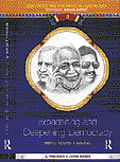
Senior reporters of daily newspapers generally have a ringside view of the political developments that shape the affairs of a state or a country. It may be as routine as the press conference of a bureaucrat or a minister or an opposition leader and as humdrum as it often gets. But there are also occasions when reporters become witnesses to the unfolding of a dramatic event or a sequence of events, which they capture vividly for the benefit of the readers.
But a reporter working for a daily, has endless deadlines to grapple with and he may not be able to fathom the nuances of the events fully. Also, it may take months for the development to unravel itself in full measure. A keen political observer with academic training, however, can dissect the developments more meticulously and find a pattern over a period of time and put them in proper perspective. Senior journalist E Raghavan and accomplished writer James Manor have combined to produce a fascinating account of an interesting phase of Karnataka’s politics in their book Broadening and Deepening of Democracy.
Though Indian democracy is over six decades old, there are very few scholarly works examining the evolution of the governments and the impact they have made on the lives of the people. There are even less accounts of the functioning of the state governments in a country as large as India.
Manor, who is a professor at the University of London, has already published three books that focus entirely or in part on Karnataka and is, therefore, no stranger to the socio-political history of the state. Manor and Raghavan, who closely followed the political developments for over two decades since 1972, have critically examined the role of two of the three chief ministers D Devaraj Urs, R Gundu Rao and Ramakrishna Hegde in shaping or more precisely, giving a dramatic twist to the state’s politics and social life in this region.
As the writers explain in great detail, with innumerable anecdotes that make very absorbing reading, Urs and Hegde contributed a great deal in their different ways to the broadening of democracy in Karnataka. The changes they brought about, fighting against considerable odds, have rightly given them an iconic status in Indian political history. Having displayed political acumen and vision which transformed Karnataka during their tenures, both Urs and Hegde desired and deserved a role at the national level when they were still in their prime, but circumstances and personalities ‘conspired’ to deny them the honour.
The battles that Devaraj Urs as chief minister (1972-80) fought to break the monopoly of powerful castes, while single-mindedly pursuing social engineering, as also the land reforms that he pushed through in the teeth of opposition, made him out as a leader with strong belief and commitment. The authors also rightly note that in a way Urs was responsible for ‘institutionalising’ political corruption, which has now grown exponentially.
Ramakrishna Hegde, who became chief minister (1983-88) by ‘chance,’ tried to change the political discourse by propagating ‘value-based politics’, but ultimately became a victim of his own hypocrisy. His greatest contributions were decentralisation of power to the village level and democratised sharing of responsibilities in the Cabinet, which threw up a new crop of leaders. The challenges he faced were less daunting than what Urs did, and as the authors note, he lacked Urs’ killer instinct.
One fails to understand why, while dealing with these two giants, a ‘pygmy’ like Gundu Rao gets so much of attention in the book. The only explanation could be that Rao happens to be a chronological link and offers quite a contrast. This book is a must read for all students of evolution of politics.